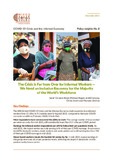| dc.contributor.author | Orleans Reed, Sarah | |
| dc.contributor.author | Rogan, Michael | |
| dc.contributor.author | Grapsa, Erofili | |
| dc.contributor.author | Ismail, Ghida | |
| dc.contributor.author | Valdivia, Marcela | |
| dc.date.accessioned | 2022-01-06T17:09:24Z | |
| dc.date.available | 2022-01-06T17:09:24Z | |
| dc.date.issued | 2021-11 | |
| dc.identifier.citation | Orleans Reed, S.; Rogan, M.; Grapsa, E.; Ismail, G. and Valdivia, M. (2021) 'The Crisis is Far from Over for Informal Workers — We Need an Inclusive Recovery for the Majority of the World’s Workforce', COVID-19 Crisis and the Informal Economy, Policy Insights 8, Manchester: WIEGO | en |
| dc.identifier.uri | https://opendocs.ids.ac.uk/opendocs/handle/20.500.12413/17021 | |
| dc.description.abstract | In The Crisis is Far from Over for Informal Workers — We Need an Inclusive Recovery for the Majority of the World’s Workforce, WIEGO presents the key findings and policy recommendations from Round 2 of the WIEGO-led COVID-19 Crisis and the Informal Economy study.
In mid-2021, WIEGO and its partners re-interviewed 1,391 Round 1 respondents (87.5% of the sample) and 213 new respondents (13.3% of the sample) to measure the longer-term impacts of the pandemic on livelihoods for domestic workers, home-based workers, street vendors and waste pickers in 11 cities.
Key findings from Round 2 are:
Most respondents have not recovered the ability to work. The average number of days worked per week was only 4 in mid-2021, still considerably lower than 5.5 in the pre-COVID period.
Earnings for informal worker respondents are still far below their pre-pandemic levels. By mid-2021, the typical worker was only earning 64% of their pre-COVID earnings. Four in every ten (40%) domestic workers, street vendors and waste pickers were still earning less than 75% of their pre-COVID earnings in mid-2021.
Home-based workers remain the hardest-hit sector, by far. In mid-2021, typical earnings of this group were only 2% of pre-pandemic levels, reflecting the depth of devastation in this predominantly female sector.
Food insecurity threatens urban workers. Nearly one-third of respondents in mid-2021 said an adult and/or child in their household had gone hungry over the last month. 57% reported challenges with dietary diversity and/or skipping meals.
Relief access is not improving and may be in decline. Access to government cash support stagnated and the percentage of respondents who received food support declined since the first three months of the pandemic. The percentages of workers who received forgiveness of rent, utilities and/or school tuition were in the single digits. | en |
| dc.language.iso | en_US | en |
| dc.publisher | Women in Informal Employment: Globalizing and Organizing (WIEGO) | en |
| dc.relation.ispartofseries | WIEGO COVID-19 Crisis and the Informal Economy;Policy Insights 8 | |
| dc.rights.uri | https://www.wiego.org/using-and-citing-material-wiego | en |
| dc.subject | Work and Labour | en |
| dc.title | The Crisis is Far from Over for Informal Workers — We Need an Inclusive Recovery for the Majority of the World’s Workforce | en |
| dc.type | Series paper (non-IDS) | en |
| dc.rights.holder | WIEGO © 2021 | en |
| dc.identifier.externaluri | https://www.wiego.org/resources/COVID-Global-policy-insights | en |
| rioxxterms.version | VoR | en |

